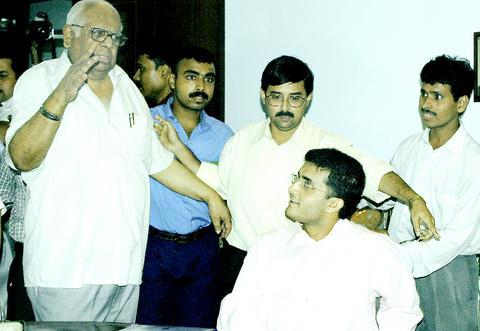Manmohan Singh, the Oxford-educated economist who crafted India's economic liberalization policies, was sworn in as prime minister yesterday, placing the Congress party back in control of the nation after eight years on the sidelines.
Singh, India's first prime minister to come from the country's influential Sikh minority, was sworn in by President A.P.J. Abdul Kalam, who is himself from India's large Muslim minority.

PHOTO: AFP
The Congress party, whose leader, Italian-born Sonia Gandhi, declined the top post last week, will lead a minority coalition after it ousted former prime minister Atal Bihari Vajpayee's Hindu-nationalist government in a tumultuous round of elections held over two months in April and May.
After several days of bargaining with coalition partners over key ministerial posts, the 71-year-old technocrat took the oath of office, dressed in a light blue Sikh turban and white, high-neck cotton tunic.
An estimated 68 other key allies were also being sworn in as Union Ministers by Kalam -- including Bollywood actor Sunil Dutt -- in a ceremony at his imposing, pink sandstone palace in the heart of New Delhi.
A Congress party official told reporters on condition of anonymity that the final list of Cabinet posts would not be made official until today. It has been widely reported that Singh himself would take on a dual role as both prime minister and finance minister, a position he held in the early 1990s under a previous Congress-led government.
Singh and Congress party president Sonia Gandhi have been meeting with leaders of different political parties to haggle over the number of spots each party would receive in the Cabinet.
Singh is expected to assign key ministries such as foreign affairs, defense and security to members of his own party, but leave several high-profile economic ministries like petroleum, communications and rural development for allies, the official said.
The partners were pleased with the results of the negotiations, which ended early yesterday, the official said.
On Friday, the leaders of the Congress-led group -- named the United Progressive Alliance, or UPA -- finished drafting an outline of the new government's political and economic priorities.
"The UPA government will give the highest priority to building closer political, economic and other ties with its neighbors in South Asia," said the draft, a copy of which was made available yesterday.
Efforts launched by the previous government to resolve India's decades-old dispute with Pakistan over the Himalayan region of Kashmir -- the cause of two wars between the nuclear rivals -- will be "pursued systematically and on a sustained basis," it said.

Philippine President Ferdinand Marcos Jr yesterday vowed that those behind bogus flood control projects would be arrested before Christmas, days after deadly back-to-back typhoons left swathes of the country underwater. Scores of construction firm owners, government officials and lawmakers — including Marcos’ cousin congressman — have been accused of pocketing funds for substandard or so-called “ghost” infrastructure projects. The Philippine Department of Finance has estimated the nation’s economy lost up to 118.5 billion pesos (US$2 billion) since 2023 due to corruption in flood control projects. Criminal cases against most of the people implicated are nearly complete, Marcos told reporters. “We don’t file cases for

A feud has broken out between the top leaders of the far-right Alternative for Germany (AfD) party on whether to maintain close ties with Russia. The AfD leader Alice Weidel this week slammed planned visits to Russia by some party lawmakers, while coleader Tino Chrupalla voiced a defense of Russian President Vladimir Putin. The unusual split comes at a time when mainstream politicians have accused the anti-immigration AfD of acting as stooges for the Kremlin and even spying for Russia. The row has also erupted in a year in which the AfD is flying high, often polling above the record 20 percent it

Ecuadorans are today to vote on whether to allow the return of foreign military bases and the drafting of a new constitution that could give the country’s president more power. Voters are to decide on the presence of foreign military bases, which have been banned on Ecuadoran soil since 2008. A “yes” vote would likely bring the return of the US military to the Manta air base on the Pacific coast — once a hub for US anti-drug operations. Other questions concern ending public funding for political parties, reducing the number of lawmakers and creating an elected body that would

‘ATTACK ON CIVILIZATION’: The culture ministry released drawings of six missing statues representing the Roman goddess of Venus, the tallest of which was 40cm Investigators believe that the theft of several ancient statues dating back to the Roman era from Syria’s national museum was likely the work of an individual, not an organized gang, officials said on Wednesday. The National Museum of Damascus was closed after the heist was discovered early on Monday. The museum had reopened in January as the country recovers from a 14-year civil war and the fall of the 54-year al-Assad dynasty last year. On Wednesday, a security vehicle was parked outside the main gate of the museum in central Damascus while security guards stood nearby. People were not allowed in because